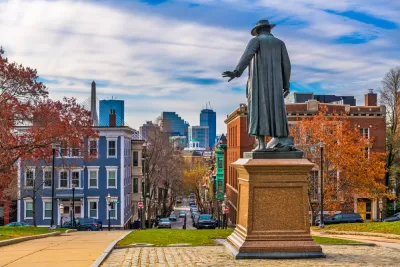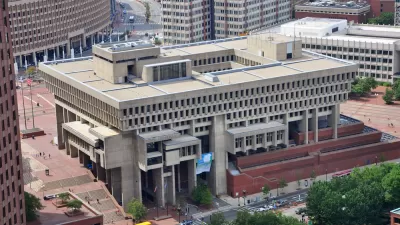It’s been nearly 60 years, but the city of Boston is finally ready to do a comprehensive rewrite of its zoning code.

[Updated: 9/14/20233] The city of Boston will update its zoning code for the first time since 1964, in a historic city that overwhelmingly tends to plan and approve development with the use of variances, rather than with by-right development.
Boston Mayor Michelle Wu announced the project earlier this week, according to a paywalled article by Catherine Carlock for the Boston Globe. The city’s zoning code currently totals 4,000 pages.
“The overhaul will start with restructuring the Boston Planning and Development Agency’s planning department to create teams focused on zoning reform and compliance, with the hopes of relying less on the Zoning Board of Appeal in the future,” reports Carlock.
“The overhaul will be guided by a report from Sara C. Bronin, a professor at Cornell University and founder of the National Zoning Atlas project, which dubs the current zoning code “bloated, outdated, inconsistent, and inequitable,’” adds Carlock for more detail. “Some of Bronin’s suggestions include reversing the city’s “longstanding practice of neighborhood-specific zoning” and culling the code to 500 pages, creating a mixed-use zoning district, and emphasizing growth and additional housing near MBTA stations.”
FULL STORY: Wu unveils plans to revamp Boston’s decades-old rules for what can be built where [paywall]

Planetizen Federal Action Tracker
A weekly monitor of how Trump’s orders and actions are impacting planners and planning in America.

Map: Where Senate Republicans Want to Sell Your Public Lands
For public land advocates, the Senate Republicans’ proposal to sell millions of acres of public land in the West is “the biggest fight of their careers.”

Restaurant Patios Were a Pandemic Win — Why Were They so Hard to Keep?
Social distancing requirements and changes in travel patterns prompted cities to pilot new uses for street and sidewalk space. Then it got complicated.

Platform Pilsner: Vancouver Transit Agency Releases... a Beer?
TransLink will receive a portion of every sale of the four-pack.

Toronto Weighs Cheaper Transit, Parking Hikes for Major Events
Special event rates would take effect during large festivals, sports games and concerts to ‘discourage driving, manage congestion and free up space for transit.”

Berlin to Consider Car-Free Zone Larger Than Manhattan
The area bound by the 22-mile Ringbahn would still allow 12 uses of a private automobile per year per person, and several other exemptions.
Urban Design for Planners 1: Software Tools
This six-course series explores essential urban design concepts using open source software and equips planners with the tools they need to participate fully in the urban design process.
Planning for Universal Design
Learn the tools for implementing Universal Design in planning regulations.
Heyer Gruel & Associates PA
JM Goldson LLC
Custer County Colorado
City of Camden Redevelopment Agency
City of Astoria
Transportation Research & Education Center (TREC) at Portland State University
Camden Redevelopment Agency
City of Claremont
Municipality of Princeton (NJ)





























